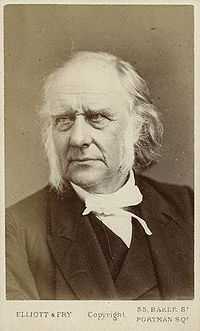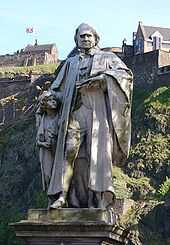Thomas Guthrie



Thomas Guthrie D.D. (12 July 1803– 24 February1873) was a Scottish divine and philanthropist, born at Brechin in Angus (at that time also called Forfarshire). He was one of the most popular preachers of his day in Scotland, and was associated with many forms of philanthropy - especially temperance and Ragged Schools, of which he was a founder.
He studied at Edinburgh University for both surgery and anatomy (under Dr Robert Knox) but then concentrated on Theology.[1] He was licenced to preach from 1852, and became the Minister of Arbirlot, in Angus, and then of Free St. John's chapel Edinburgh. Possessed of a commanding presence and voice, and a remarkably effective and picturesque style of oratory, he became perhaps the most popular preacher of his day in Scotland, and was associated with many forms of philanthropy, especially temperance and ragged schools, of which he was a founder. His hard work as a proponent and founder of Ragged Schools led him to be quoted by Samuel Smiles in his famous book Self Help.[2]
He was one of the leaders of the Free Church of Scotland, and raised over £100,000 for manses for its ministers. He was made Moderator of the Free Church of Scotland in 1872. Other roles included manager of Edinburgh Royal Infirmary, work for the Blind Asylum and work at the Night Refuge.[3]
Among his writings are The Gospel in Ezekiel and Plea for Ragged Schools (1847),[4] and The City, its Sins and Sorrows.
- Born at Brechin, Forfarshire. Minister successively of Arbirlot and of Greyfriars and St John's parish churches and of free St John's Church in this city.
Thomas Guthrie died in at his house in St. Leonards, Edinburgh in 1873 and was buried in The Grange Cemetery, Edinburgh. His grave is in a commanding position, terminating the main central avenue at its southern end. His will[5] left his copy of the National Covenant to the Free Church.
His wife, Anne Burns (1810-1899) daughter of Rev James Burns of Brechin, is buried with him.
Memorials
A fine statue in Portland stone to Guthrie stands on Princes Street in Edinburgh, facing Castle Street, by the sculptor F.W.Pomeroy. This was erected in 1910.[6] It bears the following inscriptions:
- An eloquent preacher of the gospel. Founder of the Edinburgh Original Ragged Industrial Schools, and by tongue and pen, the apostle of the movement elsewhere. One of the earliest temperance reformers. A friend of the poor and of the oppressed.
Descendants
Thomas Guthrie was father of Lord Guthrie and the great-grandfather of Tyrone Guthrie (1900–1971), a theatre director in Britain, Canada and Ireland.
![]() This article incorporates text from a publication now in the public domain: Cousin, John William (1910). A Short Biographical Dictionary of English Literature. London: J. M. Dent & Sons. Wikisource
This article incorporates text from a publication now in the public domain: Cousin, John William (1910). A Short Biographical Dictionary of English Literature. London: J. M. Dent & Sons. Wikisource
References
- ↑ Monuments and Statues of Edinburgh, Michael T.R.B.Turnbull (Chambers) p.61
- ↑ Thomas Guthrie quoted in 'Self Help', by Samuel Smiles
- ↑ Monuments and Statues of Edinburgh, Michael T.R.B.Turnbull (Chambers) p.61
- ↑ Thomas Guthrie's (first) Plea for Ragged Schools
- ↑ Scan and transcription of Thomas Guthrie's will
- ↑ Monuments and Statues of Edinburgh, Michael T.R.B.Turnbull (Chambers) p.61
External links
| Wikiquote has a collection of quotations related to: Thomas Guthrie |
- Thomas Guthrie - the foremost Scottish Divine This site includes a biography of Guthrie, several literature works by Guthrie and some sermons by Guthrie. It is one of several sites in the related Scottish Preachers' Hall of Fame.
|